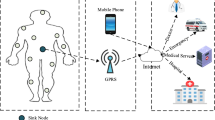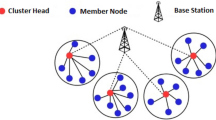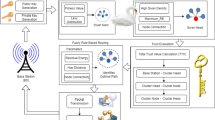Abstract
Energy consumption and security are two important aspects of Mobile Ad Hoc Networks (MANETs). In MANET, application security can be provided using trust management, key management, firewalls and intrusion detection. Moreover, it is often necessary to communicate secret information in military applications where urgent and reliable communication is more important. However, most of the existing routing algorithms do not focus on the energy and security aspects while routing. Since energy and security are important criteria for reliable communication in MANET, it is essential to consider the energy and security aspects in routing algorithms. The prevention of security attacks on routing protocols and cluster based routing automatically reduces the energy consumption. Hence, we propose a new secured routing protocol called Cluster based Energy Efficient Secure Routing Algorithm (CEESRA) in this paper which is energy efficient and uses cluster based routing in which the trust scores on nodes are used to detect the intruders effectively. This routing algorithm reduces the Denial of Service attacks more efficiently by using intelligent agents for effective decision making in routing. From the experiments conducted with this trust based secured routing algorithm, it has been observed that this proposed routing algorithm not only enhances the security but also reduces the energy consumption and routing delay.







Similar content being viewed by others
References
Yan, Z., & Prehofer, C. (2011). Autonomic trust management for a component-based software system. IEEE Transactions on Dependable and Secure Computing, 8(6), 810–823.
Li, F., & Wu, J. (2010). Uncertainty modeling and reduction in MANETs. IEEE Transactions on Mobile Computing, 9(7), 1035–1048.
Koren, A., Simunic, D., & Prasad, R. (2017). Energy-efficient and improved eWALL: e2WALL. Wireless Personal Communications, 92(1), 21–31.
Ganapathy, S., Kulothungan, K., Muthurajkumar, S., Vijayalakshmi, M., Yogesh, P., & Kannan, A. (2013). Intelligent feature selection and classification techniques for intrusion detection in networks: A survey. EURASIP-Journal of Wireless Communications and Networking, 2013(271), 1–16.
Singh, V. P., & Kumar, K. (2011). Literature survey on power control algorithms for mobile ad-hoc network. Wireless Personal Communications, 60(4), 679–685.
De Sanctis, M., Cianca, E., & Joshi, V. (2011). Energy efficient wireless networks towards green communications. Wireless Personal Communications, 59(3), 537–552.
Rohokale, V. M., Inamdar, S., Prasad, N. R., & Prasad, R. (2013). Energy efficient four level cooperative opportunistic communication for wireless personal area networks (WPAN). Wireless Personal Communications, 69(3), 1087–1096.
Biswash, S. K., Nagaraj, S., Sarkar, M., & Narra, N. R. (2017). Bee system based base station cooperation technique for mobile cellular networks. Wireless Personal Communications, 92(3), 1193–1220.
Madsen, T., Fitzek, F. H., Prasad, R., & Schulte, G. (2005). Connectivity probability of wireless ad hoc networks: definition, evaluation, comparison. Wireless Personal Communications, 35(1), 135–151.
Dang, H., & Wu, H. (2010). Clustering and cluster-based routing protocol for delay-tolerant mobile networks. IEEE Transactions on Wireless Communications, 9(6), 1874–1881.
Bao, F., Chen, I. R., Chang, M., & Cho, J.-H. (2012). Hierarchical trust management for wireless sensor networks and its applications to trust-based routing and intrusion detection. IEEE Transactions Network and Service Management, 9(2), 169–183.
Wang, Y., & Li, L. (2011). Two-dimensional trust rating aggregations in service-oriented applications. IEEE Transactions on Services Computing, 4(4), 257–271.
Nikulin, V. (2006). Weighted threshold-based clustering for intrusion detection systems. International Journal of Computational Intelligence and Applications, 6(1), 1–19.
Luo, M., Li, X., & Xie, S., (2008). An intrusion detection research based on spectral clustering. In Proceedings of 4th international conference on wireless communications, networking and mobile computing WiCOM’ 08 2008 (pp. 1–4).
Jianliang, M., Haikun, S., & Ling, B. (2009). The application on intrusion detection based on K-means cluster algorithm. In Proceedings of international forum on information technology and applications, IFITA’09 2009 (vol 1, pp. 150–152).
Jemili, I., Chaabouni, N., Belghith, A., & Mosbah, M. (2012). A multipath layered cluster based routing for ad hoc networks. In 2012 5th international conference on new technologies, mobility and security (NTMS) 2012 (pp. 1–5).
Chen, A., Xu, G., & Yang, Y. (2008). A cluster-based trust model for mobile ad hoc networks. In 4th International conference on wireless communications, networking and mobile computing 2008 (pp. 1–4).
Li, X., Jia, Z., Zhang, P., Zhang, R., & Wang, H. (2010). Trust-based on-demand multipath routing in mobile ad hoc networks. IET Information Security, 4(4), 212–232.
Das, A., & Islam, M. M. (2012). Secured trust: A dynamic trust computation model for secured communication in multiagent systems. IEEE Transactions on Dependable and Secure Computing, 9(2), 261–274.
Serique, L. F. S., & De Sousa, R. T. (2012). Evaluating trust in Ad Hoc network routing by induction of decision trees. IEEE Latin America Transactions, 10(1), 1332–1343.
Author information
Authors and Affiliations
Corresponding author
Rights and permissions
About this article
Cite this article
Muthurajkumar, S., Ganapathy, S., Vijayalakshmi, M. et al. An Intelligent Secured and Energy Efficient Routing Algorithm for MANETs. Wireless Pers Commun 96, 1753–1769 (2017). https://doi.org/10.1007/s11277-017-4266-4
Published:
Issue Date:
DOI: https://doi.org/10.1007/s11277-017-4266-4




